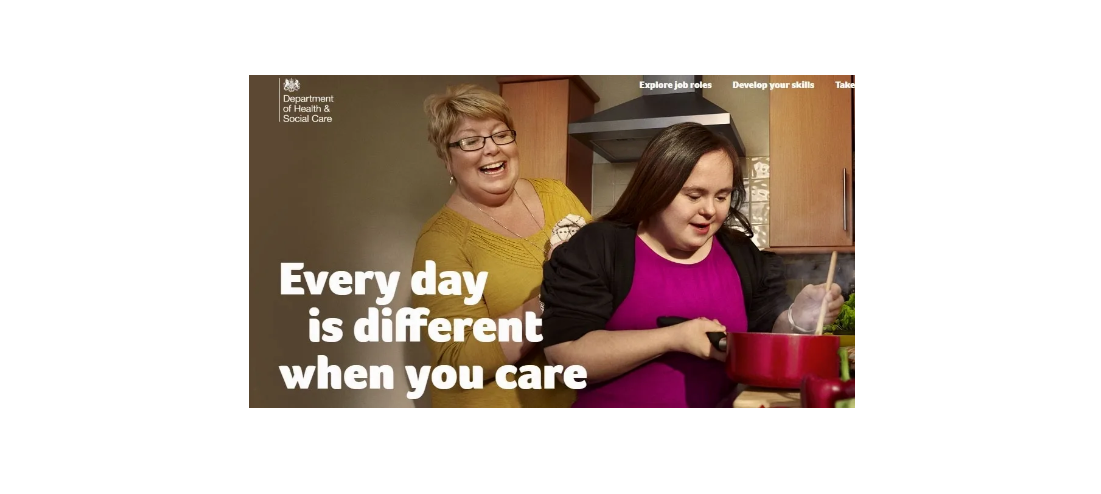The Department of Health & Social Care recently launched a new recruitment drive to get more people choosing a career in adult social care.
‘Every day is different’ is a Government-backed advertising campaign intended to increase the number of people working as care workers. Over the next six weeks, you should expect to see billboards and posters rightly commending the virtues of a job in the care sector.
During the commercial breaks in your favourite radio programmes, care workers will explain how rewarding the role can be and will point out that the pay is better than you might expect.
All of this is true. And it’s right that the Government is finally supporting such a vital sector in this way. But I fear that, however great an ad campaign, the impact will amount to little more than a drop in the ocean compared to what’s needed to keep the social care sector going – let alone provide the improvements that service users deserve. Across the country the care sector is over-extended and over-burdened. Without urgent action, we will let down some of the most vulnerable in society. To allow the care sector to continue to suffer from the chronic staff shortages from which it has long suffered will cause untold harm to young people with learning disabilities, to the neglect of our parents and grandparents and so many others who need the support of the social care sector. It will be a national disgrace that will have far-reaching consequences, not just for those who require care services but also their families, their friends and the wider economy.
Right now, there are 110,000 unfilled vacancies in the adult social care sector alone. With such a significant shortage of care sector staff, it’s no wonder that in some areas services are struggling. But this situation is only going to get worse. The UK’s ageing population means that more and more people are in need of care and a growing number have more complex care needs, but we just don’t have enough trained workers to plug the gap. Over the next ten to fifteen years, that gap is only going to grow. The Government’s conservative estimate is that an extra 650,000 care workers will be needed by 2035. That would mean employing over a third more workers than we currently do.
Unfortunately, the real figure is likely to be much higher than this. The Association of Directors of Adult Social Services (ADASS) has recently issued a warning that proposed post-Brexit immigration rules could hit EU workers in social care in the UK. They point out that a proposed £30,000 salary threshold for skilled migrants coming to work here will disproportionately affect the care sector. With care sector recruitment already unsustainably low, cutting off a major source of employees will only make the problem worse.
As a society, we need to rethink the way we judge careers in the care sector. I believe care workers should be treated with the same respect that we give to the other uniformed professions. Whether it be the police, NHS staff, or the armed forces, we quite rightly hold these professions in high esteem. We treasure the service they give to the country; their dedication to those in need of help. The same should be true of care workers. These are well-trained, experienced professionals who perform a demanding job. Day in, day out, they help some of the most vulnerable people in society, often in challenging circumstances. It’s time we showed care workers how much we value what they do.
We have made it a top priority of the CareTech Foundation to support the growth of the care sector workforce. That’s why we are funding major programmes intended to reverse the skills shortage. We have partnered with Skills for Care to run pilot projects finding ways motivate people from traditionally under-represented groups into training or employment in adult social care. We have also established a skills development programme in partnership with the EY Foundation. The programme is specifically designed to promote careers within the care sector among promising 16-19 year olds from disadvantaged backgrounds. These young people are being given training and work experience within the sector to help them practise employability skills and learn about careers in the care.
These projects have been designed to make a real world impact, but this is just the start. I am confident that programmes such as these, and the Government’s ‘Every day is different’ recruitment drive, will boost the numbers in the sector. To make a real difference, though, we need to change the perception of jobs in care. People working in care make a massive contribution to our everyday lives and help our loved ones at times when they most need it. They also make a huge difference to those who are sadly often unloved and neglected, for whom those they should be able to count upon for support just aren’t there. Isn’t it time these amazing individuals were recognised for their invaluable contribution to our country, every bit as much as doctors, nurses and the armed services?
Originally published in Care Industry News http://careindustrynews.co.uk/2019/03/government-every-day-is-different-recruitment-drive-in-social-care-doesnt-go-far-enough/

